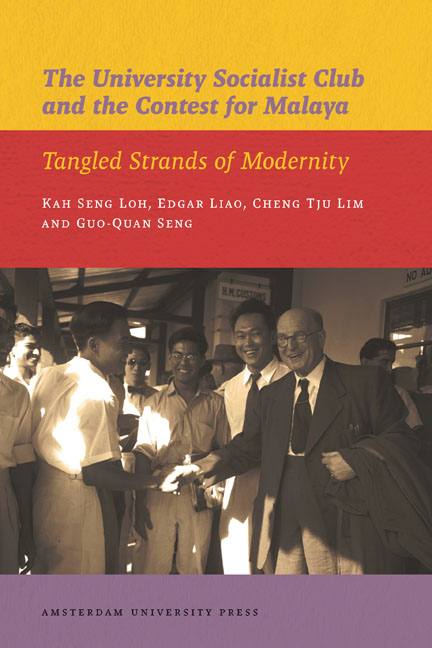Book contents
- Frontmatter
- Dedication
- Contents
- Acknowledgments
- List of Photographs
- Abbreviations
- 1 The Socialist Club and the Modernity Project
- 2 Awake in the Bowl of Night
- 3 The Fajar Trial
- 4 Visionary of the Nation, Voice of Stifled Malayans
- 5 A Beacon of Light on the Campus and Beyond
- 6 Frankly Partisan in the Struggle for Student Leadership
- 7 The Shadow over the Club
- 8 Resisting Malaysia, Swansong for Malaya
- 9 Long Night after Coldstore
- 10 In Defence of University Autonomy and Student Rights
- 11 Entwined Memories and Myths
- Conclusion: Modernity in Singapore and Malaya Reconsidered
- The University Socialists: Biographical Sketches
- Timeline of Events
- Notes
- Bibliography
- Index
- Publications Series
4 - Visionary of the Nation, Voice of Stifled Malayans
Published online by Cambridge University Press: 21 January 2021
- Frontmatter
- Dedication
- Contents
- Acknowledgments
- List of Photographs
- Abbreviations
- 1 The Socialist Club and the Modernity Project
- 2 Awake in the Bowl of Night
- 3 The Fajar Trial
- 4 Visionary of the Nation, Voice of Stifled Malayans
- 5 A Beacon of Light on the Campus and Beyond
- 6 Frankly Partisan in the Struggle for Student Leadership
- 7 The Shadow over the Club
- 8 Resisting Malaysia, Swansong for Malaya
- 9 Long Night after Coldstore
- 10 In Defence of University Autonomy and Student Rights
- 11 Entwined Memories and Myths
- Conclusion: Modernity in Singapore and Malaya Reconsidered
- The University Socialists: Biographical Sketches
- Timeline of Events
- Notes
- Bibliography
- Index
- Publications Series
Summary
The political history of 1950s Singapore is often held to begin after the trial of the Fajar 8. In the usual narrative, political developments now moved swiftly beyond the Socialist Club. The historical spotlight falls on the Labour Front government under Chief Minister David Marshall, whose party had won the 1955 general elections and who would seek full self-government for Singapore. Outside of the Labour Front, attention is often focused on the uncomfortable alliance within the People's Action Party between the Fabian socialist group led by Lee Kuan Yew and the left wing headed by Lim Chin Siong, who with other socialist activists headed a rejuvenated mass movement comprising of workers, Chinese students and rural dwellers. The Socialist Club, as it is usually portrayed, had fulfilled its role in building the requisite political and cultural bridges between the two wings of the PAP in 1953-1954 and now faded into the background. After the Fajar trial, the university authorities reported with some relief that the Club's political activities were carried out on “a rather quieter note than previously”.
The Fajar trial did serve as a catalyst in reviving progressive politics in Singapore. But this was not the Socialist Club's only contribution for the remainder of the 1950s, for it also interacted and converged with the other modernist groups, particularly the progressive political parties in Singapore like the PAP but also those in the Federation. With their confidence enhanced after the trial and with a greater sense of purpose, the University Socialists played significant roles in national and campus politics as socialists and student activists respectively. They also continued to maintain contact and work with alumni who had left the Club to participate in party politics and mass mobilisation in Singapore and Malaya. In these ways, the Club became a part of a socialist movement larger than its small number of active members.
This chapter examines the Club's contribution as a committed intelligentsia, serving as the visionary of Malayan nationalism and the voice of the marginalised masses. The Club was active in its advocacy on issues concerning labour organisation, rural poverty, communal divisions and the national language. Its endeavour was deeply rationalist, in seeking to help mobilise workers and peasants and integrate them into the fabric of the Malayan nation.
- Type
- Chapter
- Information
- The University Socialist Club and the Contest for MalayaTangled Strands of Modernity, pp. 81 - 104Publisher: Amsterdam University PressPrint publication year: 2012



